-
 Gained Extra Weight in the Lockdown? Best Slimming Tea to Get in the Right Shape and Live a Healthier Life
Gained Extra Weight in the Lockdown? Best Slimming Tea to Get in the Right Shape and Live a Healthier Life
-
 How to Increase Weight: Foods to Include in Your Diet for Your Weight Gain Journey + Tips for Gaining Weight (2020)
How to Increase Weight: Foods to Include in Your Diet for Your Weight Gain Journey + Tips for Gaining Weight (2020)
-
 10 Potent Home Remedies for Cough and Cold Plus 5 Benefits of Seeking Natural Home Remedies over Medicines (2020)
10 Potent Home Remedies for Cough and Cold Plus 5 Benefits of Seeking Natural Home Remedies over Medicines (2020)
Benefits of Drinking Turmeric Tea
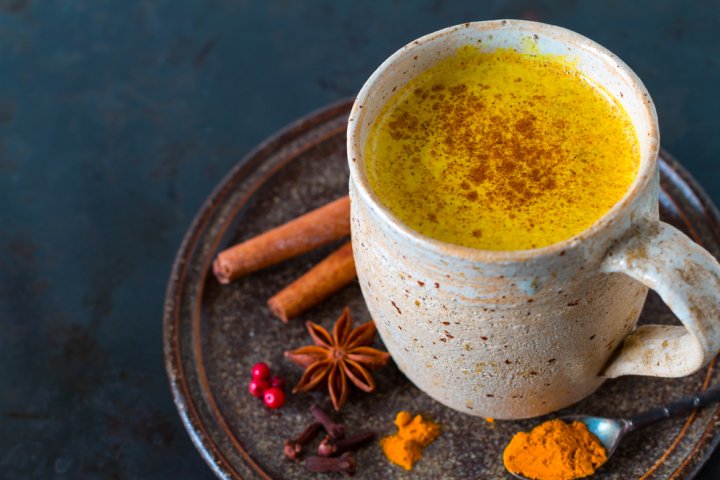
Today, there are several types of tea available in the market and many of these are beneficial for health in several ways. One such extremely healthy tea is the golden wonder - ‘Turmeric Tea’. Turmeric is one of the commonly used spices and no curry is complete without this spice. In fact, it is one of the most widely researched spices in the world. Besides using it internally, the topical use of this herb is also quite popular, as it gives a special glow to the skin.
Turmeric has almost 100 compounds. However, ‘Curcumin’, is the most talked-about element and it is credited with many of the health benefits offered by turmeric. It is rich in anti-inflammatory and immune-boosting properties and the bright yellow colour of turmeric is because of curcumin. It is also known to reduce the risk of several diseases. Turmeric tea with milk is comforting, creamy, perfectly sweet, slightly spicy, and super delicious and healthy. One should not miss the benefits offered by this wonderful tea.
Quick and Easy Turmeric Tea Recipes
Turmeric Tea
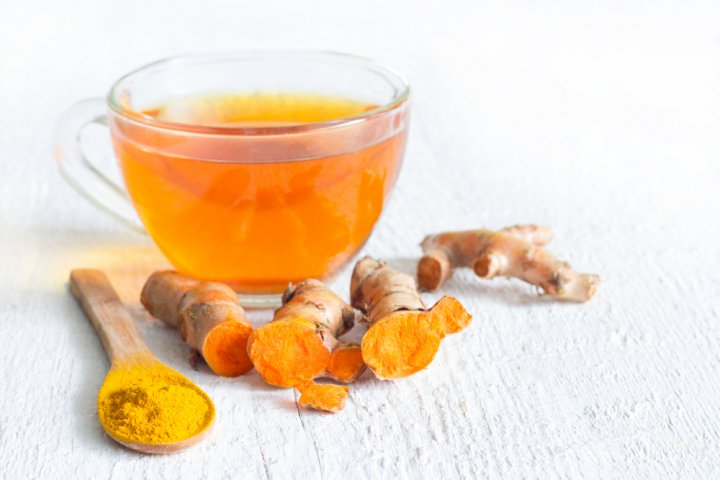
If you have inflammation it is better to avoid milk be it plant-based or dairy milk as it can aggravate inflammation-related disease.
Ingredients
- Water – 1 Cup
- Black Tea Powder – 1 tsp
- Organic Turmeric Powder – 3/4th tsp
- Ground Black Pepper – 1 tsp
- Cloves – 2
- Grated Ginger – 1 tsp
- Cardamom pods – 1
- Honey – 1 tbsp
Method
- Take water in a pan. Pour 1 cup water and add tea powder. Bring it to a boil.
- Now add all other ingredients and simmer on low heat for about 2 to 3 minutes.
- Steep the tea for 10 minutes. Strain and add honey. Enjoy when the tea is still warm!
Turmeric Tea with Dairy Milk
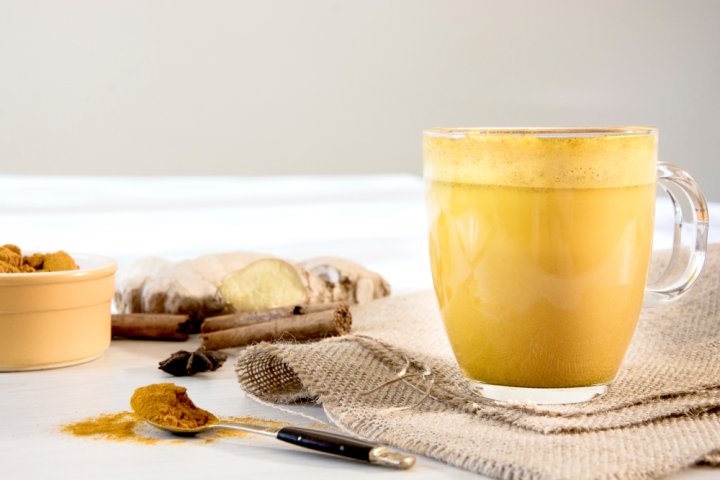
Ingredients
- Milk – ½ Cup (unsweetened milk)
- Turmeric – 1 Tsp
- Ginger – ½ Tsp
- Ground Cinnamon – ½ Tsp
- Dash of Black Pepper Powder
- Maple Syrup or Honey – 1 tsp
Method
- Combine all ingredients except maple syrup or honey and bring it to a boil. Reduce heat and simmer for about 10 minutes until you get the delicious aroma of the spices and milk turns golden yellow in colour.
- Strain the tea in a mug and add honey. Enjoy while it is still warm.
Turmeric Tea with Coconut Milk
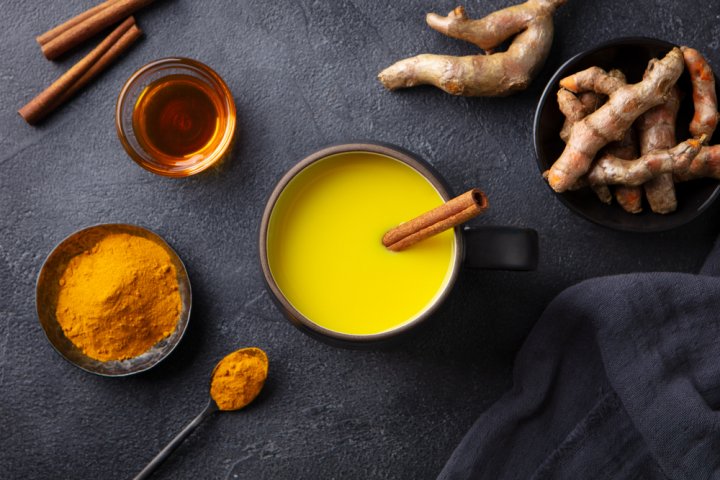
Ingredients
- Organic Coconut Milk – 1 Cup
- Ground turmeric – ½ tsp
- Ground Black Pepper – 1 Big Pinch
- Ginger Root – ¼ inch
- Honey – 1/2 tsp
Method
- Mix all ingredients well and simmer for 10 minutes on low heat. For frothier drink, you can use a high-speed blender. Add honey before serving.
Turmeric Tea with Almond Milk

Ingredients
- Almond Milk – 1 Cup (preferably homemade)
- Almond Oil – 1 Tsp
- Ground Turmeric – ½ tsp
- Ground Black Pepper – 1 Big Pinch
- Ginger Root (grated) – ¼ inch
- Ground Cardamom – a big pinch
- Honey – ¼ tsp
Method
- Mix all the ingredients except honey. Simmer on low heat for about 10 minutes.
- Add honey before serving.
How Often Should You Drink Turmeric Tea?

According to experts, an intake of 500 – 1000 mg of curcumin can be beneficial. A tsp of turmeric powder typically contains 200 mg of curcumin. So, drinking two cups of tea per day or a combination of turmeric supplements, turmeric tea, or foods cooked with turmeric would be adequate to get the benefits of this golden spice.
Benefits of Drinking Turmeric Tea
Improves Your Skin

The antioxidant, antimicrobial and anti-inflammatory properties of turmeric make it a potent ingredient to treat several skin conditions such as psoriasis, eczema, and acne.
Eases Symptoms of Arthritis

Due to its anti-inflammatory properties, turmeric eases swelling and inflammation caused due to arthritis. It also reduces painful symptoms.
Great for Diabetes Care

Studies suggest that turmeric (curcumin) helps decrease the glucose level in the blood and also reduces other complications associated with diabetes. Scientists believe that it also helps in reducing oxidative stress and inflammation, which are some of the contributing factors for diabetes. There are studies that show that turmeric can also protect against developing diabetes. So, including curcumin in the diet will help those in the prediabetic stage.
Suggested to Prevent Alzheimer’s

Studies suggest that curcumin helps reduce inflammation, cellular damage, and amyloid deposits that are quite common in neurodegenerative conditions such as Alzheimer’s. It is also known to prevent or slow down protein changes that occur due to aging and this is commonly linked to neurodegeneration.
Lowers Cholesterol

LDL (low-density cholesterol) can lead to serious conditions including stroke and heart diseases. Studies have shown that curcumin can help reduce LDL as well as total cholesterol levels in certain circumstances. Research also establishes that curcumin improves blood lipid profile in those who are diabetic, obese, have metabolic syndrome, or acute coronary syndrome. Evidence suggests that curcumin performs best in subjects who have high cholesterol levels.
Aids Digestion

Besides giving a rich colour and taste to the dishes, the reason why turmeric is used in the curry is because of its role in digesting food. Due to its anti-inflammatory and antioxidant properties, turmeric aids in healthy digestion. Hence, in Ayurveda, it is used as a digestive ingredient. Even the studies carried out in the Western countries have established the fact that turmeric contributes to efficient digestion.
Who Should Avoid Drinking Turmeric Tea?

Even though turmeric is considered to be safe, individuals with certain conditions must warrant extreme caution. Some of those conditions are listed below:
Kidney Stones:
Taking turmeric supplements can significantly increase oxalate levels thereby leading to kidney stones in susceptible people.Pregnancy and Breastfeeding:
There are no adequate studies to prove that turmeric supplements are safe during pregnancy and breastfeeding.Iron-deficiency:
Studies show that turmeric can interfere in the absorption of iron by the body. Therefore, individuals with iron deficiency should avoid taking excess turmeric, as it could inhibit the ability of the body to absorb iron.Allergic Reaction:
Certain compounds found in turmeric can cause outbreaks, rashes, and shortness of breath. This kind of allergic reaction can occur either from skin contact or ingestion.Nausea and Diarrhea:
Excess intake of curcumin can cause trouble in the gastrointestinal tract that can lead to nausea and diarrhea.
-
 Gained Extra Weight in the Lockdown? Best Slimming Tea to Get in the Right Shape and Live a Healthier Life
Gained Extra Weight in the Lockdown? Best Slimming Tea to Get in the Right Shape and Live a Healthier Life
-
 How to Increase Weight: Foods to Include in Your Diet for Your Weight Gain Journey + Tips for Gaining Weight (2020)
How to Increase Weight: Foods to Include in Your Diet for Your Weight Gain Journey + Tips for Gaining Weight (2020)
-
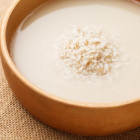 Have You Ever Thought of Incorporating Rice Water in Your Skincare Routine(2021)? Here's Our List of 5 Key Benefits that Rice Water Has for Skin, Hair, and Body.
Have You Ever Thought of Incorporating Rice Water in Your Skincare Routine(2021)? Here's Our List of 5 Key Benefits that Rice Water Has for Skin, Hair, and Body.
-
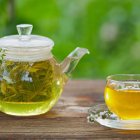 ग्रीन टी के सेवन से आपको ये 10 आश्चर्यजनक स्वास्थ्य लाभ मिल सकते हैं। 1 दिन में कितना सेवन करें। ग्रीन टी के बारे में महत्वपूर्ण जानकारी।(2020)
ग्रीन टी के सेवन से आपको ये 10 आश्चर्यजनक स्वास्थ्य लाभ मिल सकते हैं। 1 दिन में कितना सेवन करें। ग्रीन टी के बारे में महत्वपूर्ण जानकारी।(2020)
-
 Detailed Guide on How to Make Green Coffee (Both Hot & Cold) + Delicious Recipes That are a Must-try if You Call Yourself a Caféphile! (2021)
Detailed Guide on How to Make Green Coffee (Both Hot & Cold) + Delicious Recipes That are a Must-try if You Call Yourself a Caféphile! (2021)
Keep a Check On Your Allergies
Even though ingredients like turmeric are good for most people, but also remember that everyone's body reacts differently and there could be various allergies in play. So in case, you feel any adverse reaction on the consumption of turmeric, you may want to check for any prevailing allergies.

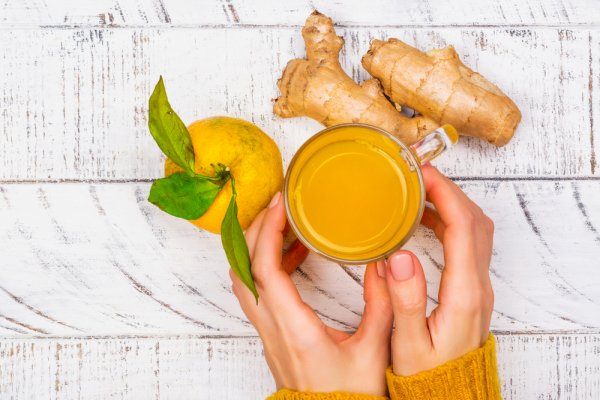
 Highlight the Best Facets of Your Incomparable Beauty: Discover the Best Face Highlighter Currently Available in India and Everything You Need to Know About Using Face Highlighters for Maximum Effect (2023)
Highlight the Best Facets of Your Incomparable Beauty: Discover the Best Face Highlighter Currently Available in India and Everything You Need to Know About Using Face Highlighters for Maximum Effect (2023)
 Forget the Blemishes and Get that Picture Perfect Flawless Radiance on Your Face: Check out the Best Foundations for Oily Skin Currently Available in India and Everything You Need to Know About Makeup Foundations (2023)
Forget the Blemishes and Get that Picture Perfect Flawless Radiance on Your Face: Check out the Best Foundations for Oily Skin Currently Available in India and Everything You Need to Know About Makeup Foundations (2023)
 Make Your Presence Felt Wherever You Go: Discover the Best Perfumes Under 2000 for Both Men and Women to Announce Your Arrival and Make Any Occasion Memorable (2023)
Make Your Presence Felt Wherever You Go: Discover the Best Perfumes Under 2000 for Both Men and Women to Announce Your Arrival and Make Any Occasion Memorable (2023)
 Protect Your Oily Skin from the Harmful Rays of the Sun: Discover the Best Gel Based Sunscreens for Oily Skin and Everything You Need to Know Before Buying One (2023)
Protect Your Oily Skin from the Harmful Rays of the Sun: Discover the Best Gel Based Sunscreens for Oily Skin and Everything You Need to Know Before Buying One (2023)
 Minor Blemishes and Wrinkles Affecting Your Confidence? Check out the Best BB Creams to Conceal Your Worries and Nourish Your Skin to Restore the Healthy, Radiant and Glowing Complexion Back Again (2023)
Minor Blemishes and Wrinkles Affecting Your Confidence? Check out the Best BB Creams to Conceal Your Worries and Nourish Your Skin to Restore the Healthy, Radiant and Glowing Complexion Back Again (2023)
